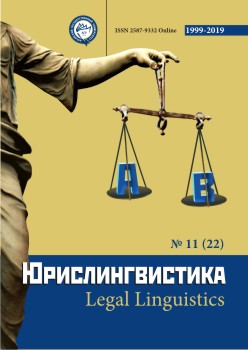THE TERM “DIGITAL LAW” IN DOCTRINE AND LEGAL TEXTS
Abstract
The legal system of Russia in recent decades has clearly faced the challenges of the global electronic economy. They are connected primarily with the fact that many groups of legal relations, which traditionally existed in the “material” form, are moving into cyberspace. It is not only about the large-scale digitalization of the sphere of sale and purchase, but also about those areas of law in respect of which their transfer to the Internet has never been assumed before (public services, electronic suffrage, etc.). If we add to this the criminal manifestations of the new digital reality, the problem stated will become even more obvious.
The absence of any comprehensive legal regulation in this area or a minimal set of basic legal terms makes domestic legislation unprotected against the rapidly developing Internet law. The article proposes the authors’ understanding of the main problematic issues of the modern digital economy, as well as outlines measures for the state’s prompt interference in the most relevant areas of digital law: blockchain, cryptocurrency, smart contract, identification of Internet users and resolution of intranet disputes, cyber security and computer crime prevention. Modern Russia has obviously been among the countries lagging behind underway towards the world economy. The task, however, does not at all imply a simple copying of foreign legal experience or mechanical transference of it onto home grounds. It is necessary to come up with an original model of legal regulation of the problem. The formulation of the concept of “digital law” should be the first step towards creating such a model.
Downloads
Metrics
References
Проект Федерального закона «О цифровых финансовых активах». URL: https://www.minfin.ru/ru/document/npa_projects/
Указ Президента РФ от 09.05.2017 N 203 «О Стратегии развития информационного общества в Российской Федерации на 2017-2030 годы».//Собрание законодательства РФ. 15.05.2017. N 20. Ст. 2901.
Архипов В. В. Интернет-право. М., 2018.
Ситдикова Р. И., Ситдиков Р. Б. Цифровые права как новый вид имущественных прав / Имущественные отношения в РФ. 2018. – №9.
Easterbrook F. N. Cyberspace and the Law of the Horse / University of Chicago Legal Forum, 1996.
Lessig L. The Law of The Horse. What Cyberlaw Might Teach / Berkman Center for Internet & Society at Harvard University, 1999.
References
Arkhipov, V.V. (2018). Internet law [Internet-pravo]. Moscow (in Russian).
Easterbrook, F. N. (1996). Cyberspace and the Law of the Horse. University of Chicago Legal Forum.
Law draft project “On Digital Financial Assets” [Proyekt Federal'nogo zakona “O tsifrovykh finansovykh aktivakh”]. Available from: https://www.minfin.ru/ru/document/npa_projects/
Lessig, L. (1999). The Law of The Horse. What Cyberlaw Might Teach. Berkman Center for Internet & Society at Harvard University.
Presidential Decree of 09.05.2017 N 203 “On the Strategy for the development of the information society in the Russian Federation for 2017-2030” [Ukaz Prezidenta ot 09.05.2017 N 203 “O Strategii razvitiya informatsionnogo obshchestva v Rossiyskoy Federatsii na 2017-2030 gody”]. Meeting of the legislation of the Russian Federation. 05/15/2017. N 20. Art. 2901 (in Russian).
Copyright (c) 2019 Антон Васильев, Жамалден Ибрагимов, Рафаил Насыров, Игорь Васев

This work is licensed under a Creative Commons Attribution 4.0 International License.
The authors, which are published in this journal, agree to the following conditions:
1. Authors retain the copyright to the work and transfer to the journal the right of the first publication along with the work, at the same time licensing it under the terms of the Creative Commons Attribution License, which allows others to distribute this work with the obligatory indication of the authorship of this work and a link to the original publication in this journal .
2. The authors retain the right to enter into separate, additional contractual agreements for the non-exclusive distribution of the version of the work published by this journal (for example, to place it in the university depository or to publish it in a book), with reference to the original publication in this journal.
3. Authors are allowed to post their work on the Internet (for example, in a university repository or on their personal website) before and during the review process of this journal, as this may lead to a productive discussion, as well as more links to this published work (See The Effect of Open Access).











